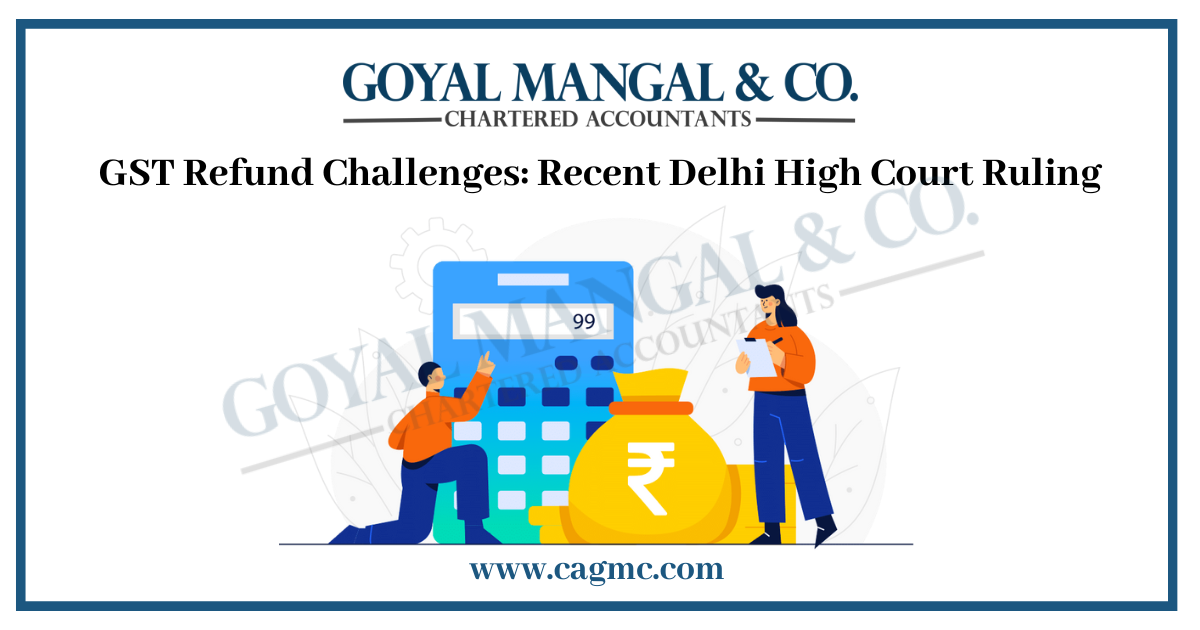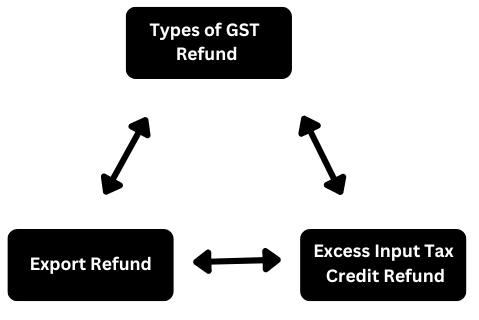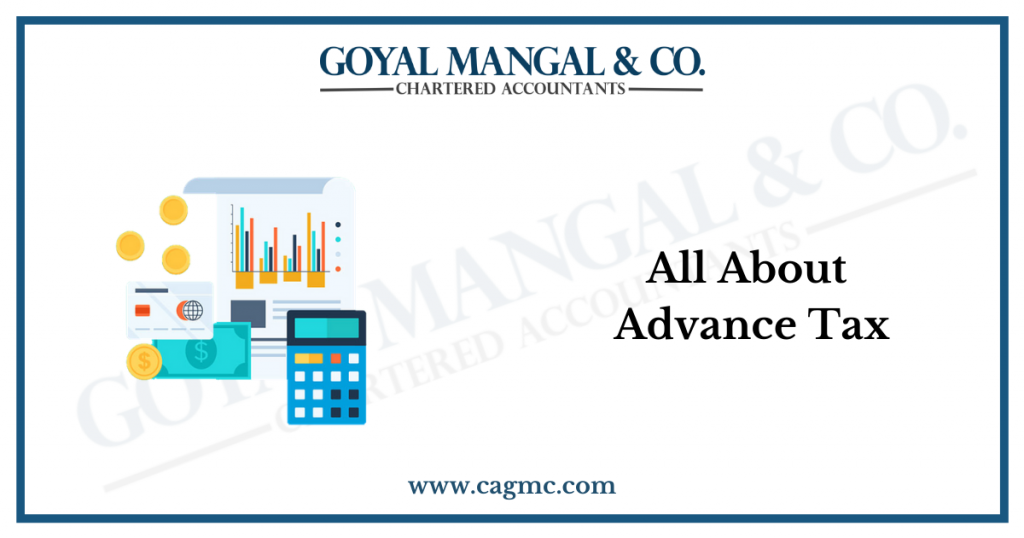
The recent ruling issued by the respected Delhi High Court Upholds GST Refund in the matter of Indian Oil Corporation Limited has determined that the Central Goods and Services Tax Commissioner and other related individuals has important implications for refunds under the GST system. The petitioner was granted a favourable ruling by the court. This blog gives detailed overview regarding the case, thoroughly analysing the evidence, concerns, and the court’s insights.
| Table of Contents |
Meaning of GST Refund
GST refund is like getting back extra money you paid in taxes. For businesses, it could happen when they paid more tax on things they bought (like raw materials) than what they owe on things they sell. There are also refunds for companies that export goods, giving them back the tax they paid on items used for those exports. There are two types of refund that is export refund or excess input tax credit refund.

Detailed Analysis
The respected Delhi High Court in the litigation of Indian Oil Corporation Limited v. has ruled that the person in charge of the Central Goods and Services Tax, along with others has important implications for refunds under the GST system. The court ruling in case number 39561/2023 determined that the Petitioner has the right to receive a refund of the accumulated Input Tax Credit (ITC) due to the varying tax rates on incoming supplies. This entitlement cannot be refused.
The GST Notification dated March 31, 2020, with the reference number 135/5/2020-GST, has been issued in accordance with Section 168(1) of the CGST Act. In relation to section 3.2 of the mentioned Circular, it was previously not possible to receive a refund of accumulated ITC if the input and output supplies were identical. However, this argument is mostly disregarded in the current case as the Petitioner claims to be unique because even though the tax rates for the main input supply and output supply are the same, the rates for other input supplies differ. Therefore, the current petition is granted.
People have certain doubts related to council rates that are council rates GST free or what if GST rate changes, so yes council rates are GST free, and government give full information regarding GST rate change on business and how to cope up with it.
Facts
The Petitioner, Indian Oil Corporation Limited, is involved in the activity of packaging and delivering LPG for both household and industrial purposes. No entry fee is required for the bulk LPG and the bottled LPG provided by the Petitioner is subject to a 5% GST rate. 65 and 165A of Schedule I attached to Notice No. The Goods Rate Notification is a document issued on June 28, 2017, bearing the reference 01/2017-Central Tax (Rate).
The person requesting reimbursement has applied for refunds for the unused input tax credits they have accumulated during different periods of taxation. The applications were recognized, but they were not dealt with. The officer in charge issued Show Cause Notices (SCN) in the prescribed form GST RFD-08 in response to the refund applications submitted by the Petitioner. The individual who made the request provided a response to the mentioned SCN (show cause notice).
Nevertheless, the Petitioner’s allegations were rejected. The applications filed by the Petitioner for different tax periods were rejected by the Revenue Department through corresponding Orders-in-Original. The Petitioner submitted separate appeals against the Orders-in-Original issued by the Respondent to the Appellate Authority. However, the appeals mentioned earlier were dismissed in a collective Order-in-Appeal dated April 21, 2023 (“Impugned Order”).
As a result, the Petitioner has brought forth a legal request to the respected Delhi High Court after being dissatisfied with the rejection of their accumulated ITC refund claims. The Petitioner’s request was rejected because the tax rate for both input supply and output supply were deemed equal. As per the Respondent, the refund is not allowed based on Clause (ii) of the exception mentioned in Section 54(3) of the CGST Act 2017.
Issue
Is it permissible to receive a refund of accumulated Input Tax Credit due to varying tax rates on inward supplies charged at different times?
Held
Delhi High Court Upholds GST Refund & has pronounced its judgement in the above-mentioned case. The number 39561/2023 is classified or described as being below or less than.
- It has been noticed that Section 54(3)(ii) of the CGST Act is relevant only when Input Tax Credit is accumulated due to the “tax rate on inputs being greater than the tax rate on output supplies”.
- In this case, the presence of multiple inputs and outputs suggests that the refund claim for Input Tax Credit (ITC) is not limited to a single source. In these situations, it is important to establish if the build-up of any Input Tax Credit (ITC) is due to the tax rate on inputs being higher than the rate of output for any cause. The taxpayer claim will be covered under Section 54(3)(ii) of CGST Act, if the situation occurs only when the rate of output is less then the rate of inputs.
- Suggested that according to Section 54(3)(ii) of the CGST Act, refund of unused input tax credit is allowed when there is a build-up of unused credit due to the input tax rate being higher than the output tax rate. However, this specific section of the Act does not provide a comparison between the tax rate on the main input and the tax rate applicable to the primary output supply.
- The court determined that the taxpayer’s request for a refund cannot be rejected. The CBIC released a notification, with reference number 135/5/2020-GST, on March 31, 2020. This notification was issued in accordance with Section 168(1) of the CGST Act.
- Regarding paragraph 3.2 of the Circular, the possibility of receiving a refund for accumulated Input Tax Credit (ITC) was not applicable in situations where the input and output supplies were identical. However, this argument is no longer relevant in the current case, as the petitioner seeks differentiation because while the tax rates on the main input supply and output supply are the same, the rate applicable to other input supplies varies.
- The instruction was given to the Respondent to manage the refund application along with any applicable interest within six weeks from the date the order was issued. As a result, the petition was granted, and all the pending applications were taken care of.
Takeaway
As the Delhi High Court Upholds GST Refund, it establishes an important example in the field of GST refunds, specifically regarding the accumulation of Input Tax Credit (ITC) caused by different tax rates on incoming supplies. The court emphasizes the significance of analysing each case individually by offering a detailed understanding of Section 54(3)(ii) and acknowledging the specific differences in the petitioner’s situation. Not only does this decision have immediate actions for the petitioner, but it also acts as a guiding principle for similar situations, highlighting the significance of comprehending the legal matters related to GST refund claims.


